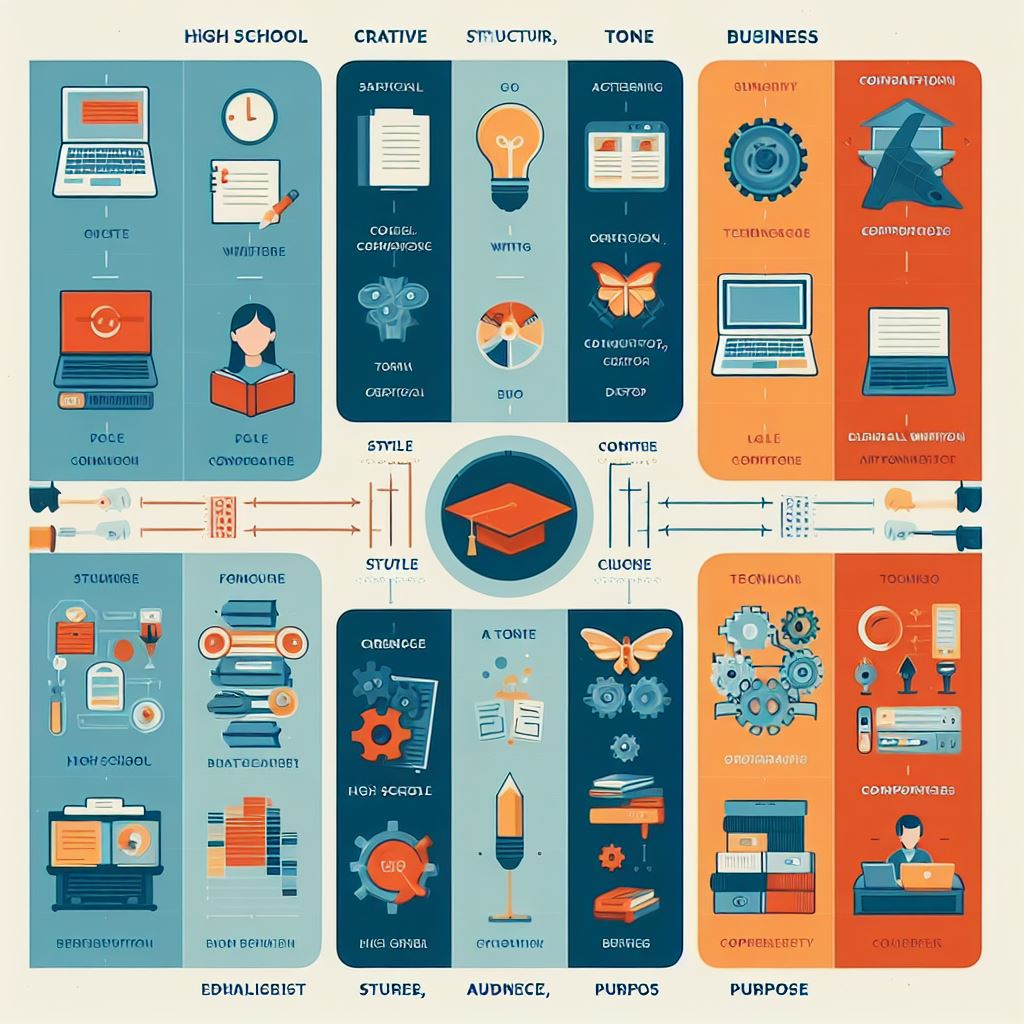What makes college writing different than the writing I’ve done up to this point?
Beginning college can be a time of uncertainty, especially concerning the expectations and standards for writing within academia. Here, writing transcends the traditional forms, evolving into what’s commonly known as “academic writing.” Though its definition may vary, at its core, it surpasses the mere conveyance of information. University-level writing, be it a research paper, a lab report, or a personal essay, demands a depth beyond the dissemination of data. Professors often look for pieces that delve into analysis or reflection, encouraging students to explore the ‘why’ behind concepts or events and provide thoughtful insights.

This shift in writing dynamics introduces a nuanced approach where writing extends beyond mere narration. It prompts students to unravel the ‘why’ behind facts or occurrences, urging them to offer comprehensive analyses or reflections. Whether tackling research papers, lab reports, personal essays, or diverse assignments, the emphasis is on transcending basic reporting to embrace a deeper exploration of underlying reasons or implications. This requirement for analysis or reflection in academic writing shapes a distinctive framework, urging students to engage critically and provide substantive insights into their work.
At its core, academic writing within a university setting goes beyond the superficial. It steers away from solely presenting information and veers into the territory of analysis and contemplation. The expectation, regardless of the assignment type, is for students to traverse beyond the surface layer, exploring the ‘why’ and weaving in their thoughtful analyses or reflections into their writing. This paradigm shift underscores the essence of university-level writing, where understanding events or ideas demands a deeper examination and articulation of underlying reasons or implications.
Engagement with Scholarly Research in University Writing
At the university level, the realm of writing expands far beyond personal insights, encompassing a broader spectrum of scholarly discourse and established research. Academic writing transforms from a solitary pursuit to an interactive dialogue with established scholars and their multifaceted contributions. This approach entails immersing oneself extensively in existing scholarly research, diving into a labyrinth of academic literature to unravel a more profound and nuanced understanding of the subject matter at hand. It delves into an intricate tapestry of theories, perspectives, and analyses, enriching the discourse by integrating various scholarly viewpoints and interpretations. This collaborative engagement with established research forms the cornerstone of university-level writing, paving the way for comprehensive and well-informed academic discussions and analyses.
A Shift Towards Scholarly Discourse:
University-level writing represents a pivotal shift from individual conjectures to a more scholarly engagement embedded within the existing academic conversation. It beckons writers to immerse themselves in a tapestry of scholarly works, analyzing the intricacies of established arguments, methodologies, and conclusions. This process propels writing beyond the boundaries of personal perspectives, advocating for a more comprehensive understanding nurtured by the insights and rigor of experts in the field. It’s not just about presenting personal opinions; rather, it’s a conscientious effort to contribute to and build upon the rich foundation of established scholarly discourse.
This shift in writing dynamics underscores the importance of critical engagement with existing academic literature. It involves dissecting and evaluating multiple perspectives, theories, and empirical evidence presented by scholars, fostering a deeper understanding and appreciation of the subject matter. Through this immersion in scholarly discourse, university-level writing aims to foster critical thinking, analytical skills, and the ability to synthesize and contribute meaningfully to the broader academic conversation. It’s a transformative journey that encourages writers to explore, question, and ultimately contribute to the collective knowledge within their field of study.
Incorporating Scholarly Insights:
Within the academic domain, students are entrusted with the crucial task of interlacing scholarly insights into their own work, a process that commences with thorough literature reviews. These reviews necessitate a meticulous examination and critique of existing research to lend depth and credibility to their arguments. However, it’s not solely about acknowledging the scholarly contributions of others; it’s about strategically integrating these insights to fortify and augment their own ideas. By referencing and discussing these scholarly works within their writing, students not only validate their arguments but also cultivate a narrative that harmonizes their unique interpretations with the broader academic discourse. This synthesis serves as a bridge, connecting personal viewpoints to the larger scholarly landscape and enriching the academic dialogue with multifaceted perspectives.
The integration of scholarly insights into academic writing isn’t a mere citation exercise but a deliberate effort to weave a tapestry of thoughts. It involves evaluating and leveraging existing research to substantiate individual arguments. This process necessitates a discerning selection and analysis of scholarly works, aligning them with the student’s perspectives to foster a coherent and enriched discourse. By skillfully intertwining these insights within their writing, students contribute to the ongoing conversation within their field of study, establishing connections between their original thoughts and the established body of knowledge, thus contributing meaningfully to the academic discourse.
Emphasis on Personal Interpretations:
University writing not only embraces established scholarly research but also places a significant emphasis on personal interpretations and analyses. Beyond summarizing existing literature, it challenges writers to articulate their own interpretations and synthesize these insights to offer new perspectives or insights within their work. This process doesn’t merely involve regurgitating information from scholars; instead, it entails evaluating, critiquing, and recontextualizing existing scholarly works to fortify one’s argumentation. It’s about how writers interpret and assimilate various scholarly viewpoints, fostering the creation of novel arguments or the reconfiguration of established theories within the context of their own research or discourse. In essence, university-level writing encourages writers not just to echo existing scholarly voices but to engage critically and innovatively with those voices, contributing fresh interpretations and analyses that add value to the academic dialogue.
Fostering Critical Thinking:
Engaging with scholarly research in writing fosters critical thinking. Students navigate various sources, discerning between different perspectives, identifying gaps, and crafting informed viewpoints. This process cultivates the ability to critically evaluate and question established knowledge, facilitating the development of a more sophisticated understanding of the subject matter.
In essence, university-level writing transcends individual perspectives, embracing an ecosystem of scholarly discourse. It involves a seamless interweaving of existing research with personal interpretations, fostering a dialogue that elevates the discourse and contributes to the broader academic conversation.
Embracing Diversity in Academic Writing: Navigating Disciplinary Conventions
Academic writing encapsulates a diverse tapestry of writing styles, norms, and research methodologies across various disciplines. Each academic field, from Sociology to Biology, History, and beyond, upholds its distinct conventions and expectations in written communication, shaping a unique landscape of scholarly discourse.
In this multifaceted academic terrain, mastering the specific writing norms of each discipline becomes paramount. Sociological writing might emphasize critical analysis and theoretical frameworks, while Biology might prioritize empirical data and scientific terminology. Meanwhile, History may favor comprehensive examinations of historical evidence and nuanced argumentation. Understanding and adapting to these diverse nuances in writing styles are pivotal for crafting effective communication tailored to resonate within each discipline.
Moreover, the distinctive expectations for written assignments diverge significantly between disciplines. Adapting to these specific expectations involves not only employing discipline-specific vocabulary but also adhering to distinct structural formats, citation styles, and argumentative approaches relevant to each field.
Beyond writing conventions, research methodologies also vary extensively among disciplines. Sociology may emphasize qualitative methods like interviews and observations, Biology might focus on quantitative analysis and laboratory experiments, and History may rely on archival research and textual analysis. Consequently, navigating these distinct research methods is equally crucial in engaging with the academic landscape across disciplines.
Ultimately, the ability to adeptly navigate and adapt to diverse writing styles and research methodologies signifies a robust command over academic writing. It showcases an understanding and fluency in the distinct conventions of various fields, enabling effective communication and engagement within the scholarly discourse of each discipline.
The skills acquired in previous writing experiences are invaluable in college-level writing. Whether it’s composing research papers, personal reflections, or reports, prior writing experiences lay a foundation for university writing. However, being receptive to new guidance and advice is equally important. College writing often complements and enhances existing knowledge, providing more nuanced and complex perspectives on the writing process. Ultimately, professors expect students to contribute intelligent and well-communicated ideas that resonate with their audience, fostering a deeper understanding of the subject matter.
What can the Writing Center do to help?
The Writing Center is your ally in every facet of the writing journey. Our support spans the entire spectrum of the writing process, ensuring your success by addressing various aspects of academic writing.
Interpreting Assignments: Navigating assignment prompts can be complex, and our support extends to breaking down these intricate tasks into comprehensible segments. The ability to comprehend and decipher assignment expectations is pivotal, and our assistance lies in aiding you to thoroughly interpret and disentangle the intricacies of these requirements. We strive to ensure that you grasp the nuances of each task, guiding you to navigate and decode assignment prompts effectively, thereby ensuring you’re not only understanding but also meeting the requisites of the task with precision and clarity.
Navigating Genres and Formats: Understanding diverse writing genres involves grasping their distinct structures and styles, which is where our support comes in. We facilitate a comprehensive understanding of different writing genres and their individual conventions, enabling you to adapt your writing style to align with specific academic requisites. By providing guidance on navigating these varying conventions, we empower you to tailor your writing to meet the specific expectations and standards associated with different genres, ensuring your work resonates effectively within diverse academic contexts.
Revision and Feedback: Revising your work is an integral step toward enhancing the quality of your writing. Our consultants specialize in providing constructive feedback aimed at refining your work. Through a meticulous review process, we identify strengths within your writing and offer insightful suggestions for improvements. Additionally, we guide you in effectively addressing professors’ comments, ensuring that your revisions align with their expectations, thus elevating the overall quality and impact of your written work.
Developing Editing Skills: Mastering the art of self-editing is an invaluable skill in the realm of writing. Our guidance encompasses techniques tailored to empower you in this endeavor, enabling you to adeptly identify and rectify errors, enhance overall clarity, and refine your unique writing style. Through our support and strategies, you’ll gain the confidence and proficiency needed to meticulously review and polish your work, fostering a sharper, more refined final product.
Early Engagement for Optimal Results: Early engagement is key to maximizing the benefits of our support throughout your writing journey. By initiating the collaboration at an early stage, you afford yourself ample time to navigate any potential challenges that may arise, fostering a smoother and more effective writing process. Our primary goal is to equip you with the essential tools and knowledge to excel in your writing pursuits, ensuring you have the guidance and resources needed to overcome obstacles and enhance your overall writing experience.
At the Writing Center, our mission is to support your growth as a writer, providing guidance and resources to enhance your writing skills and achieve academic success. Whether it’s comprehending assignments, perfecting your writing style, or navigating the complexities of academic writing, we’re here to assist you every step of the way.


